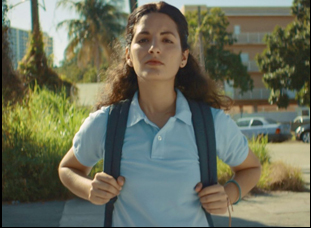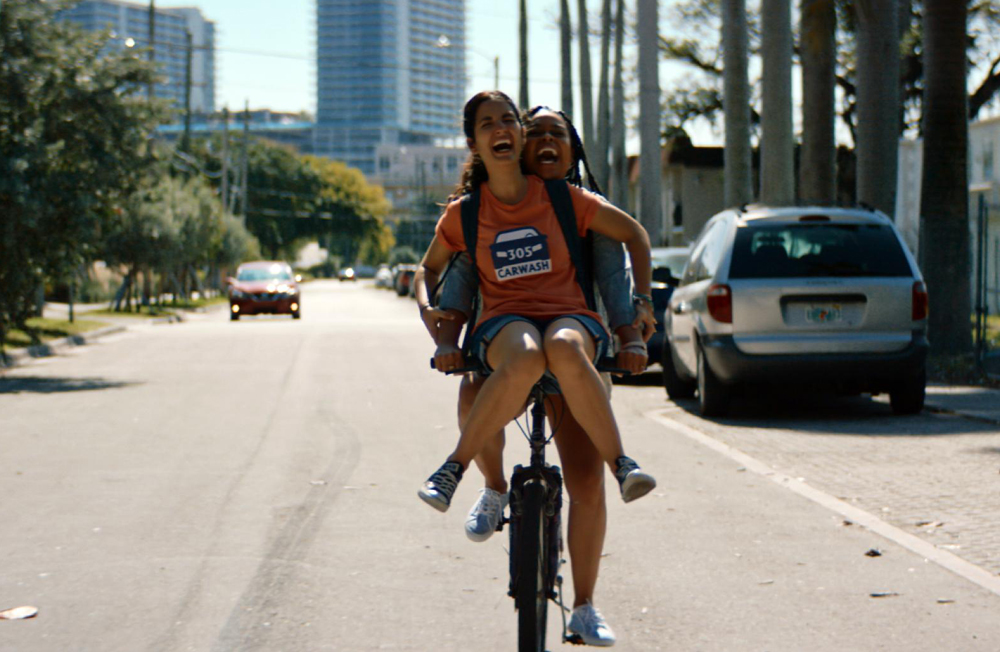When Maria Corina Ramirez was writing what would become her directorial feature debut “Bridges,” she thought of her grandfather who built them in Venezuela as she considered the gulf between what the experience of undocumented immigrants in America is really like and how it’s so often portrayed on screen. There was never going to be an overt reference to this in the story of a gifted high school senior (played by Ramirez) who is always putting her family’s future ahead of her own, but she never wavered from plans for the character to carry around a little toy bridge in her pocket as a loving tribute, incorporating it into the sizzle reel she created for potential investors, fully intending to bring it to the feature. The only problem was by then she had misplaced the tchotke she originally used as a prop.
“It was like how do we solve the bridge that she always has with her and a friend of mine was very inspired and said, ‘What about that string game that we used to play when we were little?’” Ramirez recalls, brilliantly having a game of cat’s cradle make its way into the film as a substitute. “It wasn’t only a direct link to my childhood, but a more realistic thing that this character would carry with her and also so representative [in my own mind] of not having quite the same, but seeing beyond it and making something that’s on your hand that’s just a string, dreaming and imagining it to be something else. That’s the thing about the dreamer, right? You’re seeing something in front of you, but you’re daring to transform it in your mind and then eventually maybe it comes true.”
There was a time when Ramirez surely thought “Bridges” wouldn’t become a reality, but you suspect it turned out even better than she could’ve imagined. Starring as Maria Cecilia, a valedictorian who quietly tucks away her college acceptance letters from Yale and Stanford when she knows there is no way she can leave the family, Ramirez tells of a close-knit clan living a relatively quiet life in Miami where the sacrifices are deeply felt yet largely unseen, with their patriarch still an ocean away hard at work to support them and memories of how life once always threatening to get in the way of what it could be. Maria’s mother Violeta (Marialejandra Martin) is often away on the job as well, leaving Maria and her younger sister Gaby (Nathalia Lares) to their own devices and while Gaby pins on her hopes on winning the lottery to pull them out of hardship, Maria’s idea of getting a well-paying job seems more feasible, if only she can afford to continue her education.
Ramirez brings nuance not only to her own performance as Maria, but to all the characters as a writer/director who carry on with grace in spite of the heavy burden they carry without being recognized as U.S. citizens and after a triumphant hometown premiere at the Miami Film Festival, “Bridges” is screening both physically in Los Angeles on June 5th and available to stream throughout California on June 6th as part of the L.A. Latino International Film Festival, kicking off its 20th anniversary edition June 2nd. It is just one of many exciting films at the festival that includes recent SXSW standouts “Executive Order,” “Fruits of Labor,” “Nuevo Rico” and “Women is Losers” and Tribeca highlights “Landfall” and “My Heart Can’t Beat Unless You Tell It To.” Shortly before the festival gets underway, Ramirez graciously took to the time to talk about taking the time to get “Bridges” just right, the benefits of coming to directing after a career in acting and showing the film to her family after they helped inspire it.

My family and I were undocumented for 12 years and my real life role is more like the younger sister in the film, although I was never obsessed with winning the lottery. I was always an actress and I was going to art schools my whole life, so I was like, “Maybe if I make it, this will be our way out,” so it’s similar in that sense. But while we were growing up, I watched my [older] sister be at the top of her graduating class and not be able to claim her scholarships because of our status and I was doing well as an actress. I went to a conservatory school and got my BFA, never stopping to really write my own stories until a little bit after I started working professionally as an actress.
I took to writing for therapeutic reasons rather than thinking I was going to ever make the thing, [but the script] was a convergence of that family life and watching my sister go through these struggles and a little bit also of my own — there’s always an identity crisis when you’re a teenager, but [particularly] when you’re a first-generation immigrant where you’re feeling stuck between two worlds. I was fascinated by telling that story, but also very scared because any time I had seen that kind of narrative on film, I was never really seeing myself reflected. It was always melodramatic or off-putting, and I felt there was a big gap in representation and in the way Latino families were represented in the media.
Eventually in 2016, some friends of mine and I from college won Project Greenlight Digital and we shot and wrote eight 30-minute episodes of a dramedy called “Grown.” That opened up the door for me to say, “Hey, there is a place where you can write your own stories and tell the stories that you’re passionate about” and I honestly just set out to make a film I wish I had had when I was growing up. That’s how “Bridges” happened [after] many years of working up the courage to get as vulnerable and as real about my experience and my families experience as I think I did.
You’ve said this really fell into place when you decided to direct it yourself. Did it actually help to wear all those hats?
It was actually a really soothing experience for me because usually when I watch things I didn’t direct, it wasn’t easy to separate myself from the character and I was always being judgmental of my own performance and my own work, but this time around, it really felt like I was watching a story that was separate from myself. I was just now in charge of putting it together as a director, so I was making sure that I took care of it and I honored it and I listened to what it was asking for. When I watched myself in the editing room, it really felt like it was another person and that was really key and what let me continue to do it because if I hadn’t achieved that separation, it would’ve been hard. This felt like it was something bigger than myself, and this girl whose face was reflecting back at me happened to be my own, but it didn’t feel that way. It just felt like this girl’s face represents millions and I’m going to take care of her and I’m going to take care of the story she’s telling and separate it from myself.
Was there anything you could do for the other actors that you would’ve wanted from a director yourself?
It really helps when you’re an actor [to be] a director because you know how vulnerable it is to be on that side of the camera, so the biggest thing for me is feeling safe, establishing that safety of, “Hey, we’re all jumping in this together and we’re all being really vulnerable.” Beyond a certain specific direction, it’s more the support you give, so when you show up on set, you’re looking at them in the eye when you greet them, you’re not getting frustrated, you’re giving them time for questions and saying, “Okay, let’s do this today,” taking a breath and being a friend.
It worked nicely because I was working with a range of actors, from a young girl [Nathalia Lares], [for] whom this was her first film, and that required a certain way of communicating, and then I was working with [Marialejandra Martin], a big telenovela star in Venezuela who’s worked with big directors, so it was establishing a friendship there too. I already had a friendship with her because as an actress, I actually worked with her on a play before, but the friendship thing is big, and I only know that as an actor because that’s what makes me feel at ease. I’m able to give my best because I feel the other person is part of my team and not my boss.
Is it true you were actually working with Nathalia for a number of years before this, in spite of it being her first film?
Yeah, that was actually really lovely because when we started out to do the casting for the sizzle [reel], we found her and we were astonished that this young girl was so deep and so giving off the bat. I didn’t want to lose her, but I also had to raise the funds and I had to make this thing actually happen, so I kept in contact with her. Her mother was very excited about the film and telling this story and in the mean time, she actually asked me to be [Nathalia’s acting] coach because she told me, “[Nathalia said] I loved working with her.” So of course, I agreed and I said this would be good for us to develop that relationship, so I coached her for two years or three years and at the end of each coaching session for fun, we would read a scene or two from “Bridges” to get excited. Then eventually when the time finally came, I was quite cognizant of this is a growing girl, so there’s going to come a point if I don’t do this within a certain time frame, she’s going to outgrow the role, so I have to hurry this thing up. [laughs] But thankfully it worked out.
Your character’s inner monologue becomes such a beautiful part of the film. Was it always a central part of this?
No, that actually came about in editing. A lot of it was there, but in different ways – in dialogue or moments that were said, but not in that way, and originally, the film was more about the entire family, but we were in the editing room during the pandemic — we shot this thing before everything shut down — and there was something about being able to whisper in the viewer’s ear what the experience was that started becoming really present while we were editing, so the editors and I were like, “Yeah, let’s keep going in this route.”
Since you’ve been carrying this around for so long, what’s it like getting it out into the world?
It’s liberating. It feels like it’s the right time. I’ve been working on this gift that I want to give people and by that, I mean the people that it represents, who I know feel very grateful at least from the experiences that I’ve already had with screenings, and people feel very touched that they see themselves. That’s the gift of telling our authentic stories and also for the people that it doesn’t represent to get to know the perspective and the life of someone else [because] we should all realize how similar we all are at the end of the day.
Have you gotten to show it to your family yet?
Yes, the first people that saw it actually outside of my editors and my team were my mom and my sisters and they were all very, very moved and it’s been enough time [that’s passed since it happened]. I think that’s important when creating something personal — you have to wait a little for the thing to heal, and we’ve been citizens for eight to 10 years now, so I think that helps when being able to reflect or tell the story or even watch it as a viewer. It’s been a very uplifting experience to see the power of healing through storytelling, and looking back and saying, “Yeah, we went through that, we made it and we’re good and here we are.
“Bridges” will screen at the L.A. Latino International Film Festival on June 5th at the TCL Chinese 6 at 5 pm and be available virtually, geoblocked to California, starting June 6th here.




